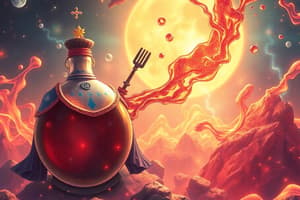Podcast
Questions and Answers
Photosynthesis is an example of?
Photosynthesis is an example of?
- An endothermic reaction (correct)
- A catalytic reaction
- An exothermic reaction
- A thermochemical reaction
What must happen before a chemical reaction can begin?
What must happen before a chemical reaction can begin?
The activation energy must be reached.
Which term describes an enzyme?
Which term describes an enzyme?
Catalyst
Which is the best definition of activation energy?
Which is the best definition of activation energy?
How does a catalyst speed up a chemical reaction?
How does a catalyst speed up a chemical reaction?
What describes a chemical reaction?
What describes a chemical reaction?
What should a researcher measure to determine if substance A affects the reaction rate?
What should a researcher measure to determine if substance A affects the reaction rate?
The lock-and-key mechanism refers to?
The lock-and-key mechanism refers to?
What happens to the amount of catalyst at the end of a reaction?
What happens to the amount of catalyst at the end of a reaction?
Flashcards are hidden until you start studying
Study Notes
Photosynthesis and Endothermic Reactions
- Photosynthesis is classified as an endothermic reaction, meaning it absorbs energy from the surroundings.
Initiation of Chemical Reactions
- Activation energy must be reached for a chemical reaction to commence; it is the minimum energy threshold required.
Enzymes as Catalysts
- Enzymes function as catalysts, substances that accelerate chemical reactions without being consumed in the process.
Understanding Activation Energy
- Activation energy is defined as the energy necessary to either form or break the bonds between reactant molecules.
Role of Catalysts
- Catalysts enhance the speed of chemical reactions by providing lower energy pathways, making reactions occur more efficiently.
Nature of Chemical Reactions
- A chemical reaction involves breaking existing bonds between atoms and forming new bonds, leading to the transformation of reactants into products.
Experimental Design in Reaction Rate Analysis
- To investigate if an inorganic substance (A) affects the reaction rate between two colored liquids (X and Y), one should first time the clarity of the mixture of X and Y, then repeat the timing with the addition of substance A. This experiment will reveal if A serves as a catalyst.
Lock-and-Key Mechanism
- The lock-and-key mechanism describes the specific complementary shapes of an enzyme and its substrate, enabling precise biochemical interactions.
Catalyst Conservation in Reactions
- At the conclusion of a chemical reaction, the amount of catalyst present remains unchanged compared to its initial quantity, highlighting its role in facilitating but not altering the overall reaction mass.
Studying That Suits You
Use AI to generate personalized quizzes and flashcards to suit your learning preferences.





